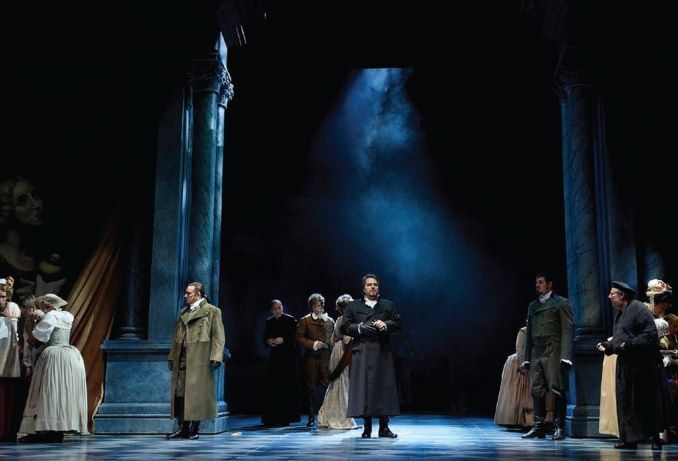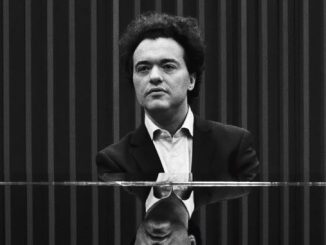The greatest Italian composer since Verdi, Giacomo Puccini was one of the first operatic superstars of the twentieth century, producing a quartet of masterpieces – La Bohème (1896), Tosca (1900), Madama Butterfly (1904), and Turandot (1924) – which remain staples of the operatic repertoire, as beloved today as they were in Puccini’s own time. Although Bohème is widely considered his greatest work – you’ll get no argument here – I retain a very big soft spot for Tosca, a start-to-finish classic of the highest order. Passionate, urgent, and with a nigh-perfect score, Tosca remains a personal favourite and an opera that I regularly listen to when I want to be reminded what true greatness sounds like.
The COC’s revival production of Tosca, last seen here in 2017, delivers nearly everything I’d want from a Tosca. The orchestra, under the baton of maestro Giuliano Carella, wrings just the right amount of emotion from the score, the production design is traditional, respectful, and well-considered, and the singing is (mostly) fine. If you are looking for an evening of profoundly moving, highly dramatic music, Tosca is a great choice – and, clocking in at just over two hours, a great choice for opera novices.

God, do I ever love the opening of Tosca.
In a bold move that firmly announces Puccini’s intentions, the opera skips out on an overture, instead opening with urgency on the brassy five-note theme which will come to dominate the piece. As the opera begins, political prisoner Cesare Angelotti (Christian Pursell) has just escaped Rome’s Sant’Angelo prison, taking refuge in the Sant’Andrea della Valle basilica. (The opera is set in 1800, during a time of political turmoil as Italian forces compete with Napoleon for control of Rome.) While Angelotti will soon exit the stage (disappearing entirely from the opera), his arrival sets in motion a chain of events that will threaten the lives of an old friend, the painter Mario Cavaradossi (Stefano La Colla), and Cavaradossi’s lover, the popular singer Floria Tosca (Sinéad Campbell-Wallace).
Director Paul Curran’s production of Tosca makes nearly all the right choices, the sole oddity being the absence of the Archangel statue from the rooftop of the Castel Sant’Angelo in the final act – an iconic image if there ever was one. Otherwise, there is much to love in the COC production, from the authentic sets and costumes to the rhythmic way characters move across stage, in time with the music. There’s something altogether lovely in the way the characters – in particular Tosca, who, after all, is a singer – seem to be unconsciously aware that they inhabit an opera. Whether it’s the thrust of a blade at the apex of a crescendo, or the sweep of a dress accentuated by a flourish of the violins, the direction is fantastic, and yet subtle enough to never be distracting.
Tosca might be described as an opera of prisoners. There’s the fugitive Angelotti, and Cavaradossi himself who (light spoilers) winds up in the clutches of the diabolically evil Baron Scarpia (Roland Wood). Tosca, too, is a prisoner of her jealousies – which at first blind her to the dangers her beloved Mario is in. She’s even a self-declared “prisoner” of an unavoidable concert engagement, which delays her from seeing Mario at a key moment. The opera’s great tenor aria, “E lucevan le stelle”, is sung by a prisoner looking back on a night when “the stars shone and the earth was perfumed.” The great soprano aria, “Vissi d’arte”, is sung by a woman on the verge of giving in to the sadistic demands of one of opera’s vilest villains. Prison cells, locked rooms, torture chambers, hidden passages all play a role in Tosca.
The singing in the COC Tosca is serviceable, but I never felt the depths of emotion as in some of the truly great Toscas. Baritone Roland Wood as Scarpia and soprano Sinéad Campbell-Wallace as Tosca (Keri Alkema will sub in for three of the eight performances) fair best, with Wood’s deep voice and flair for the dramatic doing a wonderful job of communicating Scarpia’s profound cruelty. Alkema is also very good as Tosca, leaning into the comic aspects – yes, there are comic aspects to Tosca – of the first act, as she allows her jealousy to get the better of her, before shifting into a more affecting mode, as she tries desperately to outmanoeuvre Scarpia. Stefano La Colla’s Cavaradossi is, unfortunately, the weakest link, with a nasally, strained aspect to his voice that can be distracting. He does, however, deliver where it counts, with a moving rendition of “E lucevan le stelle”, perhaps the finest four minutes in all of opera.
Minor shortcomings aside, this is a Tosca worthy of the name.
The COC orchestra is excellent as usual, the direction brings out the drama, and Puccini’s music is simply unmatched. One warning, though: in lieu of a programme, the COC made the (frankly deplorable) decision to issue a brief one-sheet which actively spoils the plot. Anyone new to this opera should avert their eyes, as Tosca has one of the most compelling, propulsive plots in the entire repertoire, which everyone deserves to experience fresh at least once.
#
The COC’s Tosca runs through May 27, 2023. Tickets are available here.



